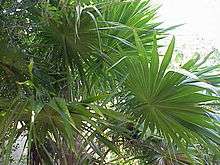Thrinax
Thrinax is a genus in the palm family, native to the Caribbean. It is closely related to the genera Coccothrinax, Hemithrinax and Zombia.[2] Flowers are small, bisexual and are borne on small stalks.
| Thrinax | |
|---|---|
 | |
| Thrinax radiata | |
| Scientific classification | |
| Kingdom: | Plantae |
| Clade: | Tracheophytes |
| Clade: | Angiosperms |
| Clade: | Monocots |
| Clade: | Commelinids |
| Order: | Arecales |
| Family: | Arecaceae |
| Subfamily: | Coryphoideae |
| Tribe: | Cryosophileae |
| Genus: | Thrinax L.f. ex Sw. |
| Species | |
| Synonyms[1] | |
Thrinax consists of three species. Thrinax excelsa and Thrinax parviflora are endemic to Jamaica. The third species, Thrinax radiata, is more widespread; it is found across the Greater Antilles, the Bahamas, south Florida, Mexico and Central America.
Taxonomy
| |||||||||||||||||||||||||||||||||||||||||||||||||||||||||||||||
| Simplified phylogeny of the Cryosophileae based on four nuclear genes and the matK plastid gene.[3] |
In the first edition of Genera Palmarum (1987), Natalie Uhl and John Dransfield placed the genus Thrinax in subfamily Coryphoideae, tribe Corypheae and subtribe Thrinacinae.[4] Subsequent phylogenetic analyses showed that the Old World and New World members of Thrinacinae are not closely related and as a consequence, Thrinax and related genera were transferred into their own tribe, Cryosophileae.[5] In 2008, Leucothrinax morrisii (formerly T. morrisii) was split from Thrinax after phylogenetic studies showed that its inclusion in Thrinax would render that genus paraphyletic.[6]
References
- "Thrinax". World Checklist of Selected Plant Species. Royal Botanic Gardens, Kew. Retrieved 10 April 2010.
- Henderson, Andrew; Gloria Galeano; Rodrigo Bernal (1995). Field Guide to the Palms of the Americas. Princeton, New Jersey: Princeton University Press. ISBN 978-0-691-08537-1.
- Cano, Ángela; Bacon, Christine D.; Stauffer, Fred W.; Antonelli, Alexandre; Serrano‐Serrano, Martha L.; Perret, Mathieu (2018). "The roles of dispersal and mass extinction in shaping palm diversity across the Caribbean". Journal of Biogeography. 45 (6): 1432–1443. doi:10.1111/jbi.13225. ISSN 1365-2699.
- Uhl, Natalie E.; John Dransfield (1987). Genera Palmarum: a classification of palms based on the work of Harold E. Moore Jr. Lawrence, Kansas: The L. H. Bailey Hortorium and the International Palm Society.
- Dransfield, John; Natalie W. Uhl; Conny B. Asmussen; William J. Baker; Madeline M. Harley; Carl E. Lewis (2005). "A New Phylogenetic Classification of the Palm Family, Arecaceae". Kew Bulletin. 60 (4): 559–69. JSTOR 25070242.
- Lewis, Carl E.; Scott Zona (2008). "Leucothrinax morrisii, a new name for a familiar Caribbean palm". Palms. 52 (2): 84–88.